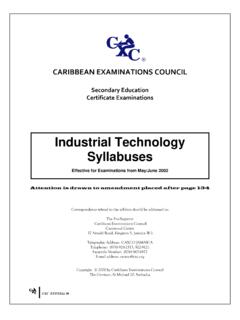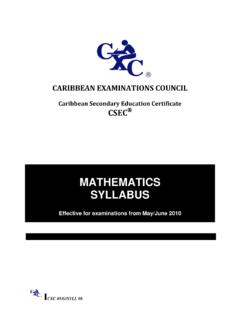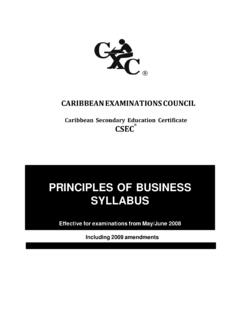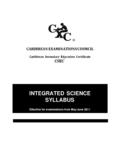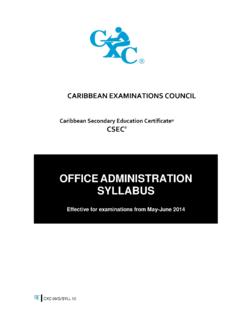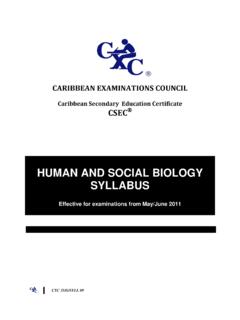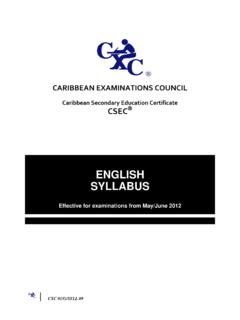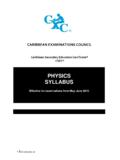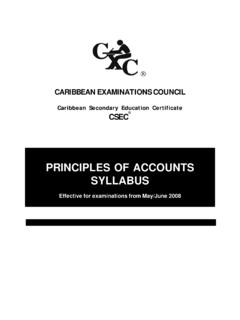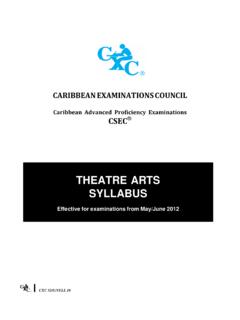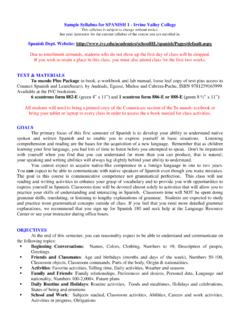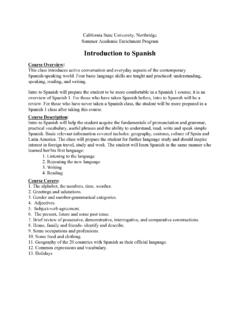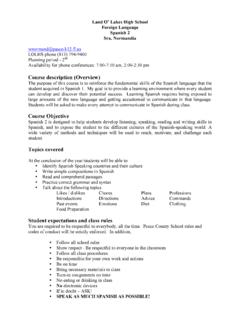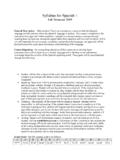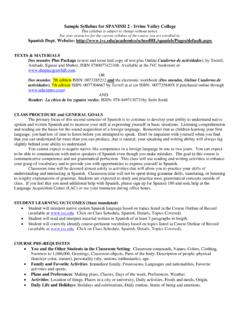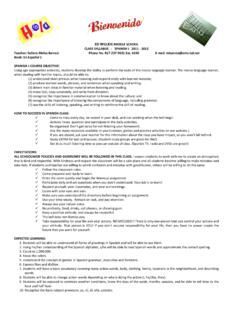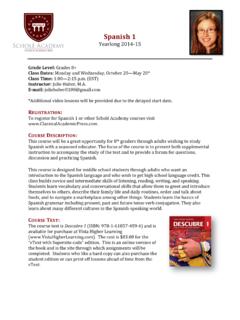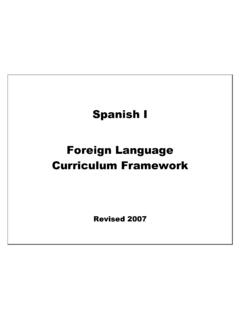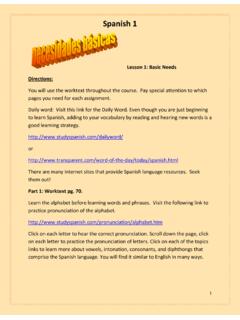Transcription of SPANISH SYLLABUS - Education
1 CARIBBEAN EXAMINATIONS COUNCIL Caribbean Advanced Proficiency Examination CAPE SPANISH SYLLABUS Effective for examinations from May June 2014 CXC 17/U2/12 Published by the Caribbean Examinations Council All rights reserved. No part of this publication may be reproduced, st ored in a retrieval system, or transmitted in any form, or by any means electronic, photocopyi ng, recording or otherwise without prior permission of the author or publisher. Correspondence related to the SYLLABUS should be addressed to: The Pro-Registrar Caribbean Examinations Council Caenwood Centre 37 Arnold Road, Kingston 5, Jamaica Telephone Number: + 1 (876) 630-5200 Facsimile Number: + 1 (876) 967-4972 E-mail Address: Website: Copyright 2012 by Caribbean Examinations Council The Garrison, St Michael BB14038, Barbados This document CXC A17/U2/12 replaces CXC A17/U2/05 issued in 2005.
2 Please note that the syl labus has been revised and amendments are indicated by italics. Issued 2001 Revised 2005 Revised 2012 Please check the website, for updates on CXC s syl labuses. CXC 17/U2/12 Contents INTRODUCTION .. i RATIONALE .. 1 AIMS .. 1 GENERAL OBJECTIVES .. 2 SKILLS AND ABILITIES TO BE ASSESSED .. 3 PRE-REQUISITES OF THE SYLLABUS .. 3 STRUCTURE OF THE SYLLABUS .. 3 UNIT 1: LA FAMILIA, LA SOCIEDAD Y EL MEDIO AMBIENTE MODULE 1: EL INDI VIDUO, LA FAMILIA Y LA VIDA DIARIA .. 5 MODULE 2: LA SOCIEDAD Y LOS ASUNTOS SOCIALES .. 8 MODULE 3: EL MEDIO AMBIENTE .. 11 UNIT 2: LAS ACTUALIDADES, LA TECNOLOG A Y LA ECONOM A MODULE 1: LAS ACTUALIDADES .. 14 MODULE 2: LA CIENCIA Y LA TECNOLOG A .. 17 MODULE 3: LA INDUSTRIA Y LOS ASUNTOS ECON MICOS .. 19 OUTLINE OF ASSESSMENT .. 22 REGULATIONS FOR PRIVATE CANDIDATES .. 32 REGULATIONS FOR RESIT CANDIDATES .. 32 ASSESSMENT GRID .. 32 GLOSSARY OF BEHAVIOURAL VERBS USED IN THE MODERN LANGUAGES EXAMINATIONS.
3 33 RESOURCES .. 37 AUDI O-VISUAL MATERIALS .. 38 CXC 17/U2/12 T Introduction he Caribbean Advanced Proficiency Examination (CAPE) is designed to provide certifi cation of the academic, vocational and technical achievement of students in the Caribbean who, having complet ed a minimum of five years of sec ondary Education , wish to further their studies. The examinations address the skill s and knowledge acquired by students under a flexible and articulated system where subjects are organised in 1-Unit or 2-Unit courses with each Unit containing thre e Modules. Subjects, examined under CAPE, may be studied concurrently or singly. The Caribbean Examinations Council offers three types of cer tification. The first is the award of a certificate showing each CAPE Unit completed. The second is the CAPE Diploma, awarded to candidates who have satisfactorily completed at least six Units, including Caribbean Studies.
4 The third is the CXC Associate Degree, awarded for the satisfactory completion of a prescribed cluster of seven CAPE Units including Caribbean Studies and Communication Studies. For the CAPE diploma and the CXC Associate Degree, candidates must complete the cluster of required Units within a maximum per iod of five years. Recognised educational institutions presenting candidates for the CXC Associate Degree in one of the nine categories must, on registering these candidates at the start of the qualifying year, have them confirm, in the required form, the Associate Degree they wish to be awarded. Candidates will not be awarded any possible alternatives for which they did not apply. CXC 17/U2/11 i A SPANISH SYLLABUS RATIONALE n important goal of foreign language learning is to help learners develop communicative and intercultural competence. Students develop cognitive flexibility and affective skills as they engage with foreign languages and cultures.
5 This SYLLABUS will contribute to the development of the Ideal Caribbean Perso n as articulated by the CARICOM Heads of Government through the exploration of bel iefs, values and behaviours, students develop respect for human life, cultural her itage and the environment thus enabling them to view the target culture from a per spective of informed understanding. The SYLLABUS emphasises the development of the four language skills (listening, reading, speaki ng and writi ng) and the acquisition of knowledge of Hispanic culture through the study of selected topics and contemporary writings of relevance to Caribbean society. Students develop multiple literacies and independent and critical thinki ng in the context of foreign language learning and in keeping with the UNESCO Pillars of Learning. While the topics have been selected to provi de knowledge and understanding of issues perti nent to Caribbean people in a global context, emphasis will be on language competence rather than on detailed technical knowledge.
6 In developing this SYLLABUS , care has been taken to ensure that it meets the knowledge, understanding and skill requirements common to post -secondary syl labuses in Modern Languages. Completion of this SYLLABUS provides a foundation for further studies and development for the world of work. This approach reflects an awareness of our regional context and is geared spec ifically to students learning Modern Languages in the Caribbean as part of the inter national community. AIMS The SYLLABUS aims to: 1. develop an awareness and appreciation of aspects of the cultural and historical contexts of Caribbean society; 2. develop an understanding of a variety of registers in the spoken and writ ten forms of SPANISH ; 3. enable students to communicate clearly and appropriately in SPANISH with an educated native speaker; 4. acquire skills necessary for collection, analysis and exchange of information, ideas and opinions in SPANISH ; 5.
7 Enhance students linguistic skills through the study of written discourse; CXC 17/U2/12 1 6. promote the study of modern Hispanic authors to acquire knowledge of contemporary society and institutions and encourage openness to life and culture in countries where SPANISH is spoken; 7. encourage the development of techniques of literary analysis. GENERAL OBJECTIVES Listen and Respond On completion of this SYLLABUS , students should: 1. understand and respond to authentic spoken language from a variety of sources such as news items, telephone messages, announcements, speeches, discussions and fil ms; 2. communicate orally in SPANISH , showing ability to choose the language and register appropriate to the context; 3. elicit and provi de opinions and information in an extended conversational exchange in SPANISH . Read On completion of this SYLLABUS , students should: 1.
8 Understand texts written in SPANISH , such as magazine and newspaper articles, reports, short stories, plays and novels; 2. select the main points of a continuous passage written in SPANISH ; 3. select information from literary texts in SPANISH to demonstrate understanding of specifi c themes and socio-cultural contexts; 4. analyse the principal literary and structural features of literary excerpts. Write On completion of this SYLLABUS , students should: 1. communicate in writing in SPANISH , showing ability to choose the language and register appropriate to the context; 2. organise and present information in a logical manner in SPANISH ; 3. organise information from literary texts to di scuss specific themes in SPANISH and English; 4. analyse themes maki ng use of literary techniques. CXC 17/U2/12 2 SKILLS AND ABILITIES TO BE ASSESSED The assessment will test candidates ability to: 1.
9 Understand and respond appropriately to authentic spoken language from a variety of sources; 2. understand texts written in SPANISH ; 3. communicate orally and in writing in SPANISH . PRE-REQUISITES OF THE SYLLABUS Any person with a good grasp of the Caribbean Secondary Education Certificate (CSEC) SPANISH SYLLABUS , or the equivalent, should be able to pursue the course of study defined in this SYLLABUS . Successful participation in the course of study also depends on: (a) good verbal and written communication skills; (b) prior exposure to the study of Literature. STRUCTURE OF THE SYLLABUS The SYLLABUS consists of two Units each containing three Modules. Each Unit requires 150 hours distributed equally across the three Modules 50 hours each. TOPICS Topics are set for the three Modules of Units 1 and 2. A list of topics is given under the Content of each Module as an indication of areas to be studied.
10 Emphasis should be placed on language competence rather than on detailed technical knowledge. These topics should be studied with reference to Hispanic culture in general, and to the SPANISH -speaking Caribbean in particular. When addressing the topics, emphasis should be placed on contemporary issues, events and concerns of a socio-political nature. It is expected that, in this way, students will develop a better understanding of themselves as Caribbean people and as members of a global society. THEMES Two thematic areas are ex amined for each Unit. Teacher s are expected to link the two themes to the relevant topic areas to achieve a more integrated approach. LITERARY ANALYSIS In Unit 1, emphasis will be placed on the student s ability to display knowledge of the basic elements of literary analysis. Excerpts from the texts listed for the themes will be used for this purpose.
